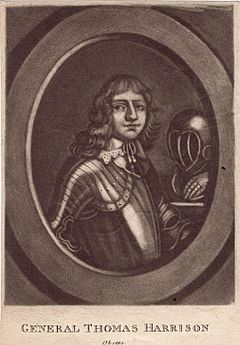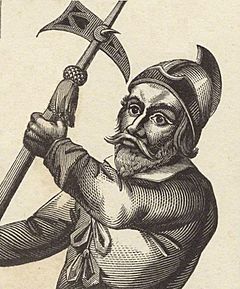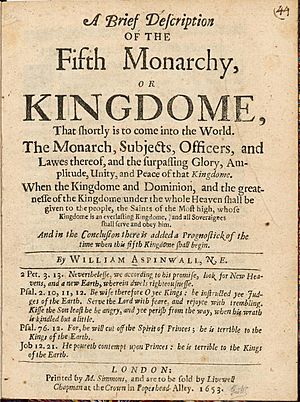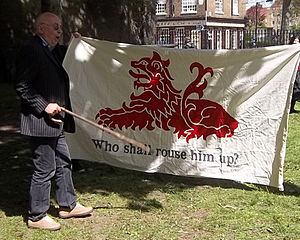Fifth Monarchists facts for kids
The Fifth Monarchists were a group of Protestant Christians in England. They were active from 1649 to 1660, during a time when England was a republic, not a monarchy. They believed that God's kingdom would soon be set up on Earth.
Their name came from a prophecy in the Book of Daniel in the Bible. This prophecy spoke of four great kingdoms that would come before a fifth, final kingdom. This fifth kingdom would be the Kingdom of God itself. The Fifth Monarchists thought that the execution of King Charles I in 1649 meant the end of the fourth kingdom. They believed this would lead to the start of God's kingdom.
They saw the new governments, like the Protectorate under Oliver Cromwell and the return of the king in 1660, as stopping God's plan. Because they believed it was their duty to fight against these governments, they were often treated harshly. They never became a very large group. Many of their leaders were executed after a failed uprising in 1661. After this, the group slowly disappeared.
Contents
What They Believed
The Fifth Monarchists got their main ideas from the four kingdoms of Daniel prophecy. They believed that the four kingdoms before God's kingdom were the Babylonian, Persian, Greek, and Roman empires. They thought the execution of King Charles I in 1649 ended the fourth, or Roman, kingdom.
Some of them were even involved in the king's execution. They believed his death would bring about the "Kingdom of the Saints." This meant that people they considered "saved" or truly religious would rule. These "Saints" felt it was their job to get everyone ready for the Second Coming of Jesus. Some thought Jesus would return in 1666, a date they linked to a number in the Book of Revelation. Others spoke of a "Thousand Years" of God's rule.
Many Fifth Monarchists also believed in "Antinomianism." This was the idea that truly "saved" people did not have to follow human laws or even the Ten Commandments. They also felt it was their duty to fight any government that got in the way of God's kingdom. Some members were peaceful, called "suffering Saints." But others, like Thomas Venner, believed in using force. These "insurrectionist Saints" caused leaders like Oliver Cromwell to see them as dangerous rebels.
How the Movement Started

The Wars of the Three Kingdoms (starting in 1639) led to many new and radical religious ideas spreading. While many Puritans believed in the idea of a coming golden age, the Fifth Monarchists made it the center of their faith. Some historians now see them more as a political group than a religious one with a clear set of rules.
Generally, Fifth Monarchists did not want religious freedom for non-Protestants. Unlike other groups, they did not want to change the social order or give political rights to everyone. They believed only the "Saved" should have power. A few exceptions included Christopher Feake, who supported the Levellers (a group wanting more equality), and Mary Cary. Mary Cary believed in gender equality and helping the poor. She wrote under the name "MC," and many thought she was a man.
The Fifth Monarchists began as a part of the Independents, a religious group that had a lot of power after 1648. They were close to Baptists and Anabaptists. Their start as a separate group is often dated to December 1651. At that time, preachers like Feake, John Rogers, and John Simpson met in London. They were unhappy that Parliament wasn't doing enough for their "Godly Revolution." They decided to actively resist the government.
Most Fifth Monarchists came from the Artisan class in London (skilled workers). They gained more attention than their numbers suggested because some important army officers joined them. These included Major Generals Thomas Harrison and Thomas Overton, and Colonels Nathaniel Rich, John Jones Maesygarnedd and William Goffe. Even Oliver Cromwell was sympathetic to their ideas at first. Their influence was strongest in April 1653 when Cromwell closed down Parliament. The Fifth Monarchists saw him as a new Moses, a leader sent by God.
They also supported Cromwell's decision to go to war with the Dutch. Even though the Dutch were Protestants, the Monarchists believed it was their duty to spread God's kingdom everywhere. Cromwell replaced the old Parliament with a new one, often called "Barebone's Parliament." About 15 of its 149 members were Fifth Monarchists. This included Praise-God Barebone, Carew, and Harrison.
The new Parliament started in July 1653. But the different groups quickly argued. The Monarchists wanted to get rid of tithes (church taxes) completely, not just reduce them. They also wanted the legal system to be based only on laws from the Bible. On December 8, the majority of Parliament asked Cromwell to dissolve it. This led to the creation of the Protectorate government on December 16.
This caused open conflict between Cromwell's government and the Fifth Monarchists. Harrison, Overton, and Rich were removed from the army. Rogers and Feake criticized Cromwell and encouraged their followers to rebel. This led to a split within the movement. Some, like John Carew, who were Baptists, did not believe in using violence. Rogers and Feake were arrested. The government tried to control the movement by sometimes punishing them and sometimes being tolerant. This worked a bit. Some members, like Rogers and Goffe, made peace with the government. This left a smaller group of rebels, like Venner, who was jailed in 1657 for planning a rebellion. By the time he was freed in 1659, the Fifth Monarchists had lost much of their power.
After the King Returned
After King Charles II returned to the throne in May 1660, Harrison was the first person found guilty of killing the previous king. He was executed in a very harsh way on October 13. One reason was his belief that it was right to use violence against "un-Godly rulers." This made him seem like a continuing threat to the new king.
This fear seemed true on January 6, 1661. Thomas Venner tried to start an uprising in London with about fifty followers. They wanted to take over the city in the name of "King Jesus." Most of them were killed or captured. Venner and ten others were executed for betraying the country on January 19 and 21. This failed uprising led to the government cracking down on all non-conformist religious groups. This ended with the Act of Uniformity 1662, which made everyone follow the Church of England.
Even though the Great Plague of London and the Great Fire of London briefly made some people think the world was ending, the Fifth Monarchy movement stopped existing as a separate group. However, some of their ideas were adopted by Baptists and others who believed God's kingdom could be achieved through spiritual means, not by force.
Important People
- Praise-God Barebone: Gave his name to the 1653 Parliament.
- John Carew: Executed in 1661 for his role in the king's death.
- Mary Cary (prophetess): A prophetess who supported gender equality.
- Christopher Feake: A Fifth Monarchist who also supported the Levellers' ideas of equality.
- Major General William Goffe: Fled to New England in 1660.
- Major-General Thomas Harrison: A key leader, executed in 1660.
- Morgan Llwyd: A Welsh leader and writer.
- John Jones Maesygarnedd: Served in the army, executed in 1660.
- Major-General Robert Overton: Imprisoned for many years.
- Major General William Packer: Briefly imprisoned after the king returned.
- Vavasor Powell: A Welsh preacher, imprisoned multiple times.
- Colonel Nathaniel Rich: Imprisoned but survived the Restoration.
- John Rogers: A preacher who went into exile.
- John Simpson: A London-based preacher.
- Anna Trapnell: A religious visionary who believed in gender equality.
- Thomas Venner: The leader of the "Fighting Saints," executed in 1661.

See also
- Fifth Empire, a similar group in Portugal.



